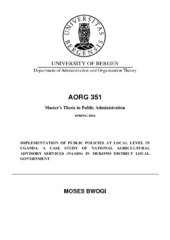| dc.description.abstract | The Government of Uganda's NAADS policy is the main overarching policy in the agricultural sector in the country. With implementation of NAADS in all 111 districts in the country, the government sought to increase accessibility of farmers to extension services in order to boost agricultural productivity in the country and eventually improve farmers' livelihood. NAADS is implemented in phases, with first phase starting in 2001 to 2007 but later extended to 2010 and phase two commenced from 2010 to 2015. This study focused on NAADS phase two because it was the most recent one and offered me easy accessibility to relevant empirical data for the study The study based on data collected from Mukono District local government to assess the challenges that affected NAADS implementation in the district. This study used qualitative research approach. Therefore, data collection methods such as interviews, FGDs, observation and documents were used to collect relevant empirical evidence for the study. To study the research problem, I sought guidance and theoretical explanations from mainly two theories: Winter's integrated implementation theory and Van Meter and Van Horn's implementation theory. Both theories proposed relevant explanatory factors that affect the policy implementation process and its results. These explanatory variables include: policy standard and objectives, policy resources from Van Meter and Van Horn's implementation theory and organizational and inter-organizational relations, political and socio-economic conditions and target-group behaviors from Winter's integrated implementation theory. The theoretical elements from both theories were merged and analyzed in the study in order to show their account on policy implementation specifically NAADS implementation at the local level. Based on the data gathered, the study realized various challenges that greatly affected the state of NAADS implementation in Mukono district. Some of the challenges highlighted in the study include: political interference in the NAADS implementation process, ambiguity of policy standard and objectives to various policy actors, insufficient financial and human resources, delayed disbursement of policy funds to the district, corruption by policy implementers, lack of budget control by local governments, poor organizational and inter-organizational relations, opposition of the reform from technical personnel, farmers, among others. The study analyzed the findings extensively in the subsequent chapters of the study and the findings purposely contribute to theory building of the two theories mainly used in the study. | en_US |
